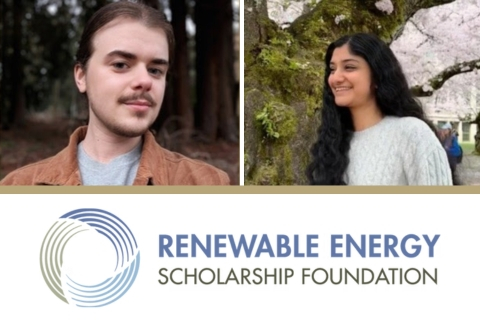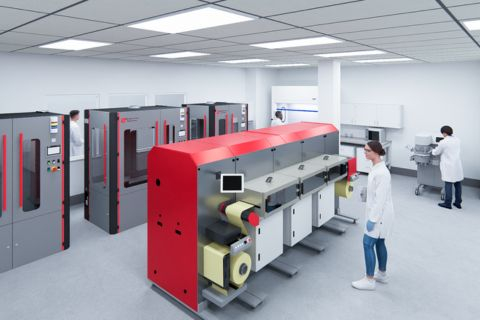
Frequently asked questions
Energy, water, food, and the environment are all interconnected. Chemical engineers use their knowledge of physics, math, chemistry, materials & energy balances, thermodynamics, kinetics, and transport phenomena to produce critical resources sustainably, without damaging the environment.
Chemical engineers address some of today’s most pressing environmental problems. Their work involves efficiently transforming raw materials into useful products, developing new materials from sustainable sources, generating clean energy, capturing emissions, and removing contaminants from the air and water. Their innovations also improve the efficiency of water filtration and treatment methods, photovoltaics and batteries, large-scale industrial processes, and more.
Solving problems in the energy, environment, and sustainability spaces inherently involves a combination of the physical, molecular, chemical, and materials sciences with process-level systems understanding. For example, solar energy generation is not just about making a material that effectively converts light to energy. It's also about making a device that can be manufactured, shipped, and installed cost-effectively enough to outcompete dirtier forms of energy. With carbon capture, it's not just about making materials that absorb CO2. It's also about producing and employing those materials in a cost-effective and carbon-negative way.
While chemists create reactions, chemical engineers study whether those reactions can be performed efficiently enough to be worth implementing. Chemical engineers design processes to make a reaction cost-effective in order to compete with existing technology. Chemical engineers consider the entire lifecycle of reactants and products, including how easily they can be disposed of. Chemical engineers design tools that allow reactions to be performed at scale.
No other major or specialization combines this molecular-level understanding with the systems-level perspective.
ChemE and BSE are both good places for someone interested in process engineering and manufacturing of natural resources into fuels and products. Both majors provide the fundamentals of transport processes and process design. BSE majors focus more on the specific application of natural products chemistry, biomaterials, and bioconversion to develop products and fuels from renewable resources. ChemE majors have a strong foundation in the principles that underlie these processes but are less specialized on them and chemical engineers seek employment in a wider range of industries.
The two degrees are closely enough related that it is sometimes possible for highly motivated students to complete both degrees in a 5 year timespan. Students from both departments also frequently apply for master’s programs in chemical engineering.
Someone who is excited about computing will thrive in both disciplines. However, while CSE is about how computing happens, and ChemE includes aspects of this, the real focus of ChemE is on using tools like computing to solve problems that have a big impact on people’s health, climate and the environment. The scale of data available is a great fit for the systems perspective of chemical engineering and has the power to transform our future.
For example, ChemE’s use the tools of data science, machine learning and artificial intelligence to create new medicines, design and manufacturer clean energy solutions like space-age solar energy materials, and new ways to manufacture everyday products that use less energy, fewer non-renewable resources in a sustainable way. The tools of data science are embedded in a ChemE’s training, for ChemE’s need to know how to manage the data and computing needs of billion dollar semiconductor fabrication facilities with tools like Internet of Things and edge machine learning for real time process control.
Electrical Engineers and chemical engineers are both critical contributors to the emerging clean energy economy, but each plays different and complementary roles. Electrical Engineers are specialists in electrical power systems—how to connect, control, and deliver electricity reliably where it is needed—whereas chemical engineers are giving electrical engineers innovative and affordable new devices for generating, storing, and using electricity.
For example, chemical engineers are involved in battery formulation, manufacturing, and recycling, in the development (and recycling) of light weight composites for wind turbines, and manufacturing of energy efficient devices (like LED lighting) that have scaled globally in just a decade. Likewise, chemical engineers are responsible for reducing the carbon footprint of fuels used in transportation and electricity generation.
Someone who is excited by and cares about the environment and climate will thrive in both Chemical Engineering and Environmental Engineering. While these fields share many of the same fundamental concepts, environmental engineers tend to focus more on understanding how the world and its ecosystems behave, the role that humans play in affecting those ecosystems, and the technologies that can play a role in controlling or improving the environment. Chemical engineers tend to focus more on the chemical reactions taking place in those environments and the creation of new tools that can be used to study the environment or address issues affecting the environment. The knowledge that chemical engineers gain about chemistry, system processes, and materials allows them to see environmental problems from both a systems-level perspective and from the perspective of individual reaction events, and often rely on Environmental Engineers for a broader perspective on how those reactions or processes affect other aspects of the environment.
For example, chemical engineers are involved in wastewater remediation and treatment, carbon capture, recycling, soil remediation, the removal of toxic contaminants, oil spill clean-up, desalination, and toxic gas neutralization. Chemical engineers also have the opportunity to design new processes in the most environmentally friendly way. Environmental engineers help assess current and emerging risks to the environment and human health and work closely with civil and chemical engineers to create new remediation technologies which maximize benefit and mitigate detrimental environmental impacts.
Chemical engineers design, build and analyze processes that range in size and duration, from the nano-scale to the manufacturing-plant level. ChemE's work on:
- Scaling up a process developed in a lab to reach as many people as possible
- Optimizing a process to be more economical, environmentally friendly, and energy efficient
- Replacing petroleum-based products such as plastics with plant-based materials that perform as well or better
- Reducing waste and shipping weight by concentrating products without sacrificing quality or stability
- Reducing pollution from substances such as microplastics and managing waste more sustainably
- Improving energy efficiency, energy storage, and energy conversion
- Improving carbon capture and storage and water treatment technologies
Customize ChemE to YOUR interests
ChemE is a cohort-based program, which means you never have to worry about when to take core classes or whether there will be space when you need it. You'll be able to focus on developing relationships with your classmates, faculty members, and advisers, as well as customizing your experience to your interests. We encourage you to take ownership over your education. We provide guidance to help you identify and pursue your interests while developing strong chemical engineering fundamentals.
All ChemE students take at least 16 credits of engineering electives. Some students choose a broad array of electives and others choose to focus most of their electives in a specific area of their interest, called an optional focus area. Here are some examples of engineering electives that relate to the environment, sustainability, and energy.
- BSE 406: Natural Products Chemistry (5)
- BSE 420: Bioresource Engineering (4)
- BSE 426: Bioresource Laboratory (4)
- BSE 430: Papermaking Processes (4)
- CHEM E 341: Energy and Environment (3)
- CHEM E 440: Energy Materials, Devices, and Systems (3)
- CHEM E 442: Renewable Energy (4)
- CHEM E 445: Fuel Cell Engineering (3)
- CHEM E 461: Electrochemical Engineering (3)
- CHEM E 484: Electronic and Optoelectronic Polymers (3)
- CHEM E 498: Solar Energy Conversion and Solar Cells (3)
- CHEM E 498: Battery Systems Engineering (3)
- ME 430: Advanced Energy Conversion Systems (4)
- CEE 348: Hydrology and Environmental Fluid Mechanics (4)
- CEE 327: Transportation Engineering(3)
- CEE 349: Case Studies in Environmental Engineering (3)
- CEE 352: Introduction to Microbial Principles in Environmental Engineering (4)
- CEE 354: Introduction to Chemical Principles in Environmental Engineering (5)
- CEE 356: Quantitative and Conceptual Tools for Sustainability (4)
- CEE 357: Environmental Engineering (5)
- CEE 420: Engineering with Developing Communities (DIV)
- CEE 462: Applied Limnology and Pollutant Effects on Fresh Water
- CEE 480: Air-quality Modeling (3)
- CEE 482: Wastewater Treatment and Reuse
- CEE 490: Air Pollution Control (4)
- CEE 495: Sustainability and Design for Environment (3)
All ChemE students take at least 24 credits of Areas of Impact, including at least 3 credits of DIV, 10 credits of VLPA, and 10 credits of I&S. We encourage students to consider using these credits as another way to deepen knowledge and gain a breadth of perspective on the areas of interest to them. Here are some examples of areas of knowledge courses that relate to the environment and sustainability.
- CEP 200 Introduction to Community and Environment (I&S)
- ENV H 220 Global Environmental Change and Public Health (I&S)
- GEOG 272 Geographies of Environmental Justice (I&S and DIV)
- ENGL 265 Introduction to Environmental Humanities (I&S/VLPA, and DIV)
- ENVIR 239 Sustainability: Personal Choices, Broad Impacts (I&S)
- CEE 420: Engineering with Developing Communities (DIV)
- ENVIR 200 Climate Governance (I&S, DIV)
- ENVIR 211 Environmental Justice (I&S, DIV)
- GEOG 123 Introduction to Globalization (I&S, DIV)
- ENVIR 243 Environmental Ethics (VLPA/I&S)
- JSIS B 391 Climate Change - An International Perspective: Science, Art, and Activism (VLPA or I&S)
- ATM S 358 Fundamentals of Atmospheric Chemistry (NW)
- ATM S 458 Air Pollution Chemistry (NW)
- ATM S 480 Air-Quality Modeling (NW)
- PHYS 217: Energy Future: The Technical and Social Barriers to Large-Scale Sustainable Energy (I&S) (No Credit if Chem E 341 is taken)
- JSIS B 357: The Geopolitics of Energy (I&S)
- GEOG 472: Geographies of Energy & Sustainability (I&S)
A large proportion of students study abroad while earning their chemical engineering degrees for both summer and autumn quarters, with courses counting toward engineering electives and core coursework. Sustainability-related programs include:
- Engineering Jordan: Water in an Arid Land
- Engineering Pacific Northwest: Sustainable Water in a Wet Region
- Engineering Italy: Water and Environment in Southern Italy
- Engineering Rome: 3,000 years of Engineering contributions to infrastructure and society
- SIT Iceland: Renewable Energy, Technology, and Resource Economics
- CIEE Dublin: Summer Engineering, Technology, & Society
Common RSOs that ChemE students participate in include:
Over 70% of BS ChemE students participate in undergraduate research while earning their degrees. Students can do undergraduate research in any engineering lab and count up to 9 credits toward engineering electives for degree requirements. Most research opportunities are not posted on the website. The best way to get involved is to read about the faculty on our research pages and email the professor you're most interested in researching with to see if they have space in their lab. ChemE faculty are on the cutting edge of research in the following areas:
- Photovoltaics
- Batteries
- Fuel cells
- Electronic polymers
- Electrochemical systems
- Energy systems integration
- Energy conversion processes
- Materials for photonic and electronic energy conversions
- Large scale energy storage and utilization
- Biocompatible materials
- Bio-inspired materials
All ChemE students take a senior design course or a capstone course.
Standard option
The standard capstone option is taking CHEM E 486: Process Design II. Students work in teams to design complex systems with consideration to economic and other constraints. Examples:
- Convert Carbon-neutral electricity to liquid fuels (2016)
- Solar Cell Manufacturing Facility (2015)
- Manufacturing pathways to earth-abundant solar cells (2014)
- e-gas (2014)
Industry Capstone Program
The Industry Capstone Program brings together UW students and companies to tackle real-world, multidisciplinary engineering problems. Sponsors bring in projects from their companies and provide support to teams of creative, talented engineering students who will design and build innovative solutions. Examples:
- Extracting Heavy Metals from Mining Wastewater (Membrion - 2022)
- Characterization and Application of Recycled Carbon Fiber (Boeing - 2022)
- Efficient Purification of Green Surfactants (Sironix - 2021 & 2022)
- Techno-Economic Evaluation of Water Treatment Methods for Hardness Reduction (Membrion - 2021)
Entrepreneurial Design Sequence
This is a three-quarter design sequence in which small teams of ChemE students research, design, and develop a business plan for a new product. Teams participate in the NW Business Plan Competition. Students receive credit for both the capstone and engineering electives. (CHEM E 499, CHEM E 497) Examples:
Nano and Molecular Engineering option
The NME option introduces students to nanoscale principles in molecular engineering, provides hands-on experience and stresses the interdisciplinary of this field. Students who complete the option have it noted on their transcript after graduation.
Optional focus areas
Students who wish to deepen their knowledge in a specific subject may pursue an optional focus area, combining engineering electives, undergraduate research, study abroad, internship, and capstone experience to create an individualized learning experience that is in-depth in a specific area. Students who complete a focus area will receive a certificate at graduation.
Many students with an interest in energy and sustainability pursue optional focus areas in Environmental Engineering, Polymers, Composites, Colloids, and Interfaces or Energy Systems.
Career opportunities
ChemE alumni are involved in water treatment and air quality management; sustainable consumer packaged goods; clean energy technologies such as batteries, solar energy, fuel cells, and nuclear power; “green” materials development; sustainable products for buildings; and more traditional energy fields like oil and gas.
Common employers:
- Puget Sound Energy
- King County Wastewater
- Seattle Public Utilities
- Sironix Renewables
- Membrion
- Puget Sound Naval Shipyard
- Phillips 66
- BlueDot Photonics
- Trinity Consultants
- Sedron Technologies
- Washington River Protection Solutions
- NVL Labs
Common titles in industry:
- Process Engineer
- Project Engineer
- Test Engineer
- Manufacturing Engineer
- Quality Engineer
- Procurement Engineer
- Consultant



